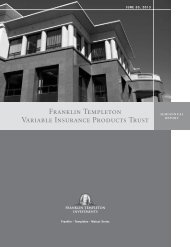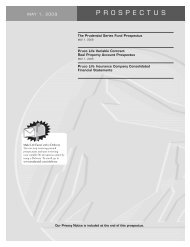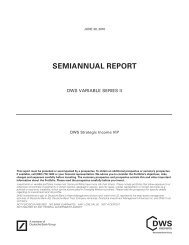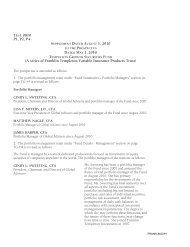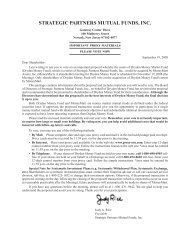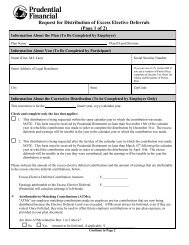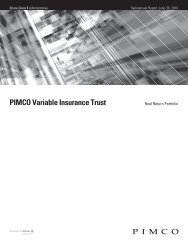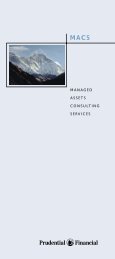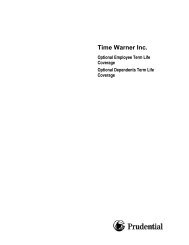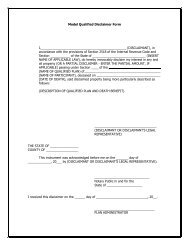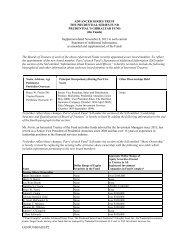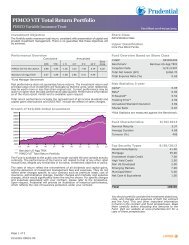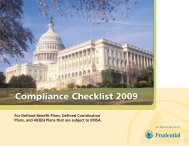The Prudential Series Fund
The Prudential Series Fund
The Prudential Series Fund
You also want an ePaper? Increase the reach of your titles
YUMPU automatically turns print PDFs into web optimized ePapers that Google loves.
<strong>The</strong> Portfolio may also invest in obligations issued or guaranteed by the U.S. Government, its agencies and instrumentalities. Up to<br />
30% of the Portfolio’s assets may be invested in foreign equity and equity-related securities. For these purposes, we do not consider<br />
American Depositary Receipts (ADRs) and similar receipts or shares traded in U.S. markets as foreign securities.<br />
<strong>The</strong> Portfolio may also pursue the following types of investment strategies and/or invest in the following types of securities:<br />
■ Alternative investment strategies—including derivatives—to try to improve the Portfolio’s returns, to protect its assets or for<br />
short-term cash management.<br />
■ Purchase and sell options on equity securities, stock indexes and foreign currencies.<br />
■ Purchase and sell stock index and foreign currency futures contracts and options on those futures contracts.<br />
■ Forward foreign currency exchange contracts.<br />
■ Purchase securities on a when-issued or delayed delivery basis.<br />
■ Equity swap agreements.<br />
■ Short sales against-the-box.<br />
■ Repurchase agreements. <strong>The</strong> Portfolio may participate with certain other Portfolios of the <strong>Fund</strong> in a joint repurchase account<br />
under an order obtained from the SEC.<br />
■ Equity and/or debt securities issued by Real Estate Investment Trusts (REITs).<br />
■ Illiquid securities<br />
In response to adverse market conditions or when restructuring the Portfolio, we may invest up to 100% of the Portfolio’s assets in<br />
money market instruments. Investing heavily in money market securities limits our ability to achieve our investment objective, but<br />
can help to preserve the Portfolio’s assets when the markets are unstable.<br />
<strong>The</strong> Portfolio is managed by Jennison Associates LLC (Jennison).<br />
Money Market Portfolio<br />
<strong>The</strong> investment objective of this Portfolio is to seek the maximum current income that is consistent with stability of capital and<br />
maintenance of liquidity. While we make every effort to achieve our objective, we can’t guarantee success.<br />
We invest in a diversified portfolio of short-term debt obligations of the U.S. Government, its agencies and instrumentalities, as well<br />
as commercial paper, asset backed securities, funding agreements, certificates of deposit, floating and variable rate demand notes,<br />
notes and other obligations issued by banks, corporations and other companies (including trust structures), and obligations issued by<br />
foreign banks, companies or foreign governments.<br />
<strong>The</strong> net asset value for the Portfolio will ordinarily remain at $10 per share because dividends are declared and reinvested daily. <strong>The</strong><br />
price of each share remains the same, but when dividends are declared, the value of your investment grows. We make investments<br />
that meet the requirements of specific rules for money market mutual funds, such as Investment Company Act of 1940 (Investment<br />
Company Act) Rule 2a-7. As such, we will not acquire any security with a remaining maturity exceeding thirteen months, and we<br />
will maintain a dollar-weighted average portfolio maturity of 90 days or less. In addition, we will comply with the diversification,<br />
quality and other requirements of Rule 2a-7. This means, generally, that the instruments that we purchase present “minimal credit<br />
risk” and are of “eligible quality.” “Eligible quality” for this purpose means a security is: (1) rated in one of the two highest short-term<br />
rating categories by at least two major rating services (or if only one major rating service has rated the security, as rated by that<br />
service); or (2) if unrated, of comparable quality in our judgment. All securities that we purchase will be denominated in U.S. dollars.<br />
Commercial paper is short-term debt obligations of banks, corporations and other borrowers. <strong>The</strong> obligations are usually issued by<br />
financially strong businesses and often include a line of credit to protect purchasers of the obligations.<br />
An asset-backed security is a loan or note that pays interest based upon the cash flow of a pool of assets, such as mortgages, loans<br />
and credit card receivables. <strong>Fund</strong>ing agreements are contracts issued by insurance companies that guarantee a return of principal,<br />
plus some amount of interest. When purchased by money market funds, funding agreements will typically be short-term and will<br />
provide an adjustable rate of interest.<br />
Certificates of deposit, time deposits and bankers’ acceptances are obligations issued by or through a bank. <strong>The</strong>se instruments depend<br />
upon the strength of the bank involved in the borrowing to give investors comfort that the borrowing will be repaid when promised.<br />
We may purchase debt securities that include demand features, which allow us to demand repayment of a debt obligation before the<br />
obligation is due or matures. This means that longer term securities can be purchased because of our expectation that we can<br />
44



